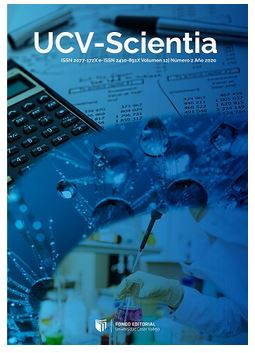Knowledge, Attitudes and Practices against acute diarrheal disease in mother of children under 5 years
DOI:
https://doi.org/10.18050/RevUcv-Scientia.v8n1a4Keywords:
Diarrhea, Knowledge, Attitudes and practicesAbstract
This research descriptive cross-sectional comparative with quantitative approach. The population was represented by mothers of children under 5 who come to Belén Hospital of Trujillo (HBT) and EsSalud Hospital of Florencia de Mora Trujillo. The main objective was to identify habits, customs and worldview that favor or not the prevalence of acute diarrheal diseases. The minimum age of mothers was 15 years and the maximum was 56. At Hospital EsSalud Florencia de Mora the percentage of mothers who had a maximum of 2 children was 79.4% in contrast to the HBT where it was found that 30.2% of mothers had 3 more. More than a half of mothers of EsSalud Hospital Florencia de Mora had only studied up to secondary level and 47.6% had higher education. The mothers interviewed in the EsSalud Hospital of Florencia de Mora was obtained that 68.3% of them are engaged only housewife, contrasting with the HBT where only 57.1% of mothers engaged in this work. In addition, the HBT, 54.8% of mothers were engaged in some kind of work outside the home whether it is dependent or independent, while for the first establishment only 31.7% of mothers worked outside the home. In both hospitals dominates a good level of knowledge against acute diarrheal disease, without significant differences between them. The attitudes taken against acute diarrheal disease are comparable in both hospitals with a very good attitude in most of them. Most mothers in both hospitals have good practices against acute diarrheal disease, with no significant differences between the two hospitals
Downloads
Published
How to Cite
Issue
Section
License

This work is licensed under a Creative Commons Attribution-NonCommercial 4.0 International License.
- Share — copy and redistribute the material in any medium or format
- Adapt — remix, transform, and build upon the material.
- The licensor cannot revoke these freedoms as long as you follow the license terms.
Under the following terms:
-
Attribution — You must give appropriate credit, provide a link to the license, and indicate if changes were made. You may do so in any reasonable manner, but not in any way that suggests the licensor endorses you or your use.
- No additional restrictions — You may not apply legal terms or technological measures that legally restrict others from doing anything the license permits.













